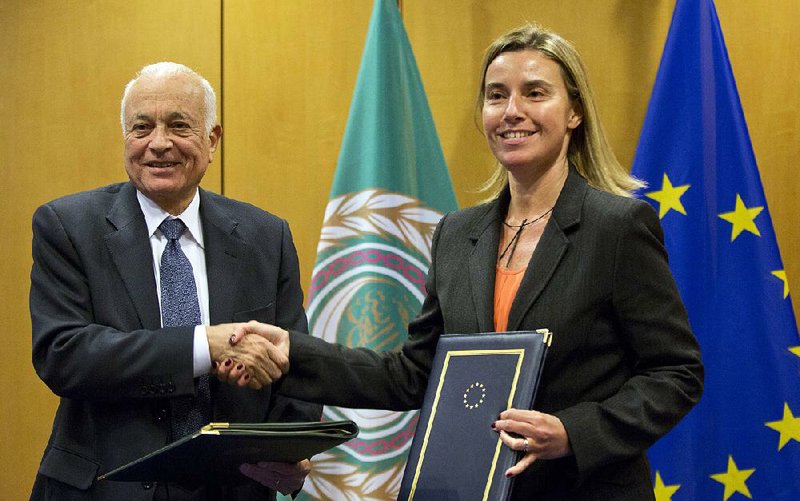BRUSSELS -- European foreign ministers gathered Monday in Brussels to discuss increased law enforcement cooperation after recent attacks in France and the foiling of a possible plot by Muslim extremists in Belgium.
"The threat is not only the one we faced in Paris, but one that is spreading to many other parts of the world, starting with Muslim countries," Federica Mogherini, the European Union's foreign affairs chief, said Monday.
Mogherini, who on Monday also met with the secretary-general of the Arab League, Nabil Elaraby, said that European countries needed to bolster cooperation among themselves as well as with countries outside Europe, particularly in the Arab world.
"We need to cooperate more, to share information more," she said.
The foreign ministers' meeting, the first of senior European Union officials since a three-day series of attacks that killed 17 people in Paris this month, will add to pressure to establish a European system for exchanging passenger information, similar to one introduced in the United States after the attacks of Sept. 11, 2001.
Proposals for such a program in Europe were put forward years ago but were stalled because of opposition from the European Parliament, where many lawmakers worried about violating the privacy of citizens. The exchange of passenger name records would include information about seat numbers, flight reservation dates, payment methods and travel itineraries.
"I hope that the European Parliament is going to change its attitude," Didier Reynders, Belgium's foreign minister, told journalists.
He said that recent events in Belgium, where Thursday the police killed two people suspected of planning an attack, highlighted the need to "keep track of the whole group of fighters who have left for Syria."
The Belgian authorities have said that the plot they disrupted last week in the country's east involved several people who had returned from Syria.
They have not yet named any suspects, but the Belgian news media said the ringleader was Abdelhamid Abaaoud, a 27-year-old Belgian of Moroccan origin who had traveled to Syria to join the Islamic State. Abaaoud appeared in a video last year that showed him in a pickup truck dragging a heap of mangled corpses.
Some news outlets reported Monday that Abaaoud had been detained in Greece over the weekend and that his extradition had been requested by Belgium on Sunday. But the Greek police Monday identified the man whose extradition had been sought as a 33-year-old Algerian.
The Algerian man was traced in Athens on Saturday after an appeal for assistance from the Belgian authorities, and he was arrested Sunday, a statement from the police said.
In earlier statements, officials in Greece and Belgium ruled out any link between several suspects detained for questioning in Athens and the possible plot last week. Belgian prosecutors on Sunday changed their position, saying that one of the suspects in Greece was wanted in connection with the case "following further analysis of the elements of our investigation."
Eric Van Der Sypt of the Belgian federal prosecutor's office said by telephone Monday that Belgium was requesting an extradition from Greece, but he declined to identify the person in question. He cautioned that the extradition could take weeks if the detainee in Greece fought the request.
Worried about potential attacks on Jewish sites, embassies and other possible targets, Belgium on Saturday deployed 150 paratroopers in its capital, Brussels, and Antwerp, a diamond-trading center with a large Orthodox Jewish population. It was the first time troops have been used for domestic security in more than 20 years.
Meanwhile, European leaders also opened an appeal against last month's EU court ruling that ordered the Palestinian group Hamas removed from its terror list for technical reasons, Mogherini said.
She said the council of ministers would challenge some of the court's finding and consider future action to avoid similar annulments. At the same time, the EU appeal suspended the effects of the Dec. 17 EU court ruling until a final decision is taken.
Hamas was put on the EU terrorist list as part of broader measures to fight terrorism after the Sept. 11 attacks, and its funds were frozen. Hamas has long contested the classification.
An EU high court said last month the reason for listing it was based too much on media and Internet reports and not enough on acts examined by competent authorities.
The U.S. and Israel list Hamas as a terror organization because of its history of attacks aimed at civilians.
The Israeli foreign ministry welcomed the EU appeal, saying "the decision reflects well the position that Hamas was and remains a terror organization."
Mogherini said that the freezing of funds and the ability to put some organizations on a terror list were essential to contain terror financing.
Information for this article was contributed by Andrew Higgins, James Kanter and Niki Kitsantonis of The New York Times and by Raf Casert and Ian Deitch of The Associated Press.
A Section on 01/20/2015

